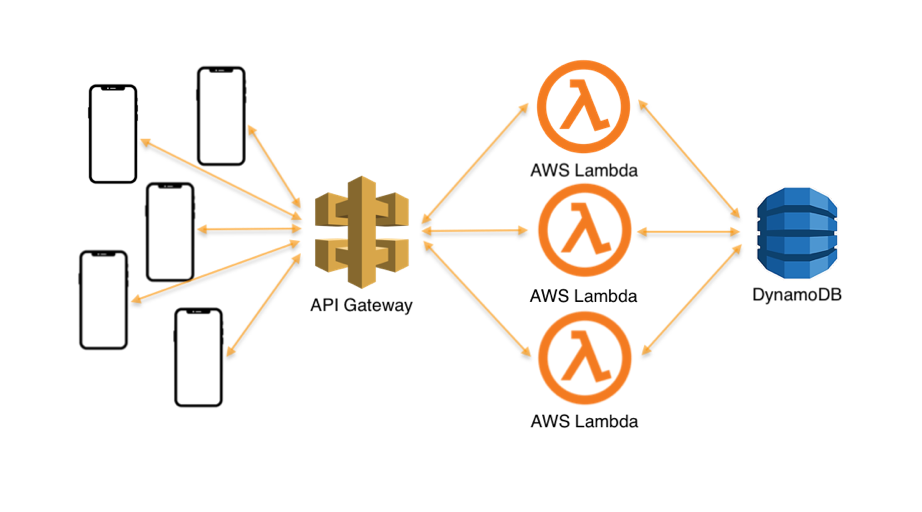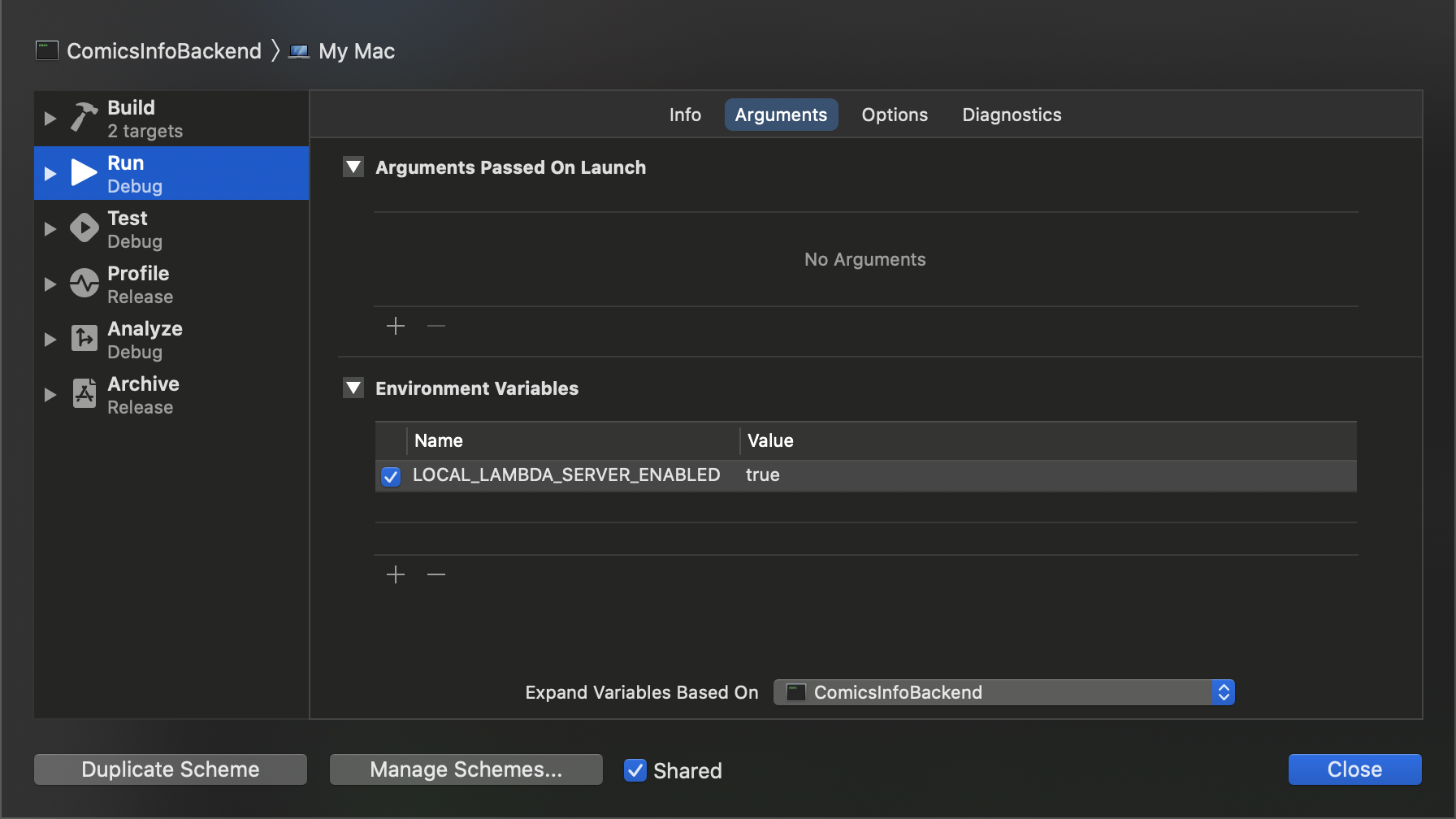The backend part of the Comics Info app. This app is responsible for storing, organizing, and managing data so that the client, Comics Info app, can use it. The basic idea is to create Swift Serverless REST API with Amazon Web Services (AWS).
This app uses serverless architecture based on AWS. There are a lot of benefits of serverless architecture but the crucial one for this app is that we can focus just on our app and let AWS think about the underlying infrastructure (machines, VMs, containers, etc.).
We will need a couple of services from Amazon:
- API Gateway: A service that makes it easy to create, publish, maintain, monitor, and secure APIs. API Gateway will act as the single point of entry to our Lambda functions.
- Lambda: Let us run code without provisioning or managing servers. We pay only for the compute time our lambda consumes. The idea is to define a lambda for each API endpoint.
- DynamoDB: NoSQL database service that supports key-value and document data structure.
- Swift: https://swift.org/download/
- Docker: https://docs.docker.com/docker-for-mac/install/
- Amazon Web Service account: https://aws.amazon.com
- AWS CLI: https://docs.aws.amazon.com/cli/latest/userguide/install-cliv2-mac.html
Create a directory and open it.
$ mkdir ComicsInfoBackend
$ cd ComicsInfoBackendCreate a new Swift project with the Swift Package Manager.
$ swift package init --type executableThe first thing that we need to do is to add a dependency to Swift AWS Lambda Runtime. With that in place, we can handle the communication with the Lambda Runtime Interface. One more dependency that we need is Swift AWS SDK which provides native Swift API for us to interact with DynamoDB. In Package.swift in the dependencies section add the next line:
.package(url: "https://github.com/swift-server/swift-aws-lambda-runtime.git", .upToNextMajor(from:"0.2.0")),
.package(url: "https://github.com/soto-project/soto.git", .upToNextMinor(from: "5.0.0-beta.1"))After this, we also need to add the target’s dependencies:
.product(name: "SotoDynamoDB", package: "soto"),
.product(name: "AWSLambdaRuntime", package: "swift-aws-lambda-runtime")In CharacterInfo.swift we can run our Lambda for working with Characters:
public final class CharacterInfo {
public func run(handler: Handler? = Handler(rawValue: Lambda.handler)) throws {
switch handler {
case .read:
Lambda.run {
LambdaHandlerFactory.makeReadLambdaHandler($0)
}
case .list:
Lambda.run {
LambdaHandlerFactory.makeListLambdaHandler($0)
}
case .create:
Lambda.run {
LambdaHandlerFactory.makeCreateLambdaHandler($0)
}
case .update:
Lambda.run {
LambdaHandlerFactory.makeUpdateLambdaHandler($0)
}
case .delete, .none:
throw ComicInfoError.handlerUnknown
}
}
}LambdaHandlerFactory will make a handler for our Lambda. For the read example, LambdaHandlerFactory will make ReadLambdaHandler.
import AWSLambdaEvents
import AWSLambdaRuntime
import Foundation
import NIO
public struct ReadLambdaHandler: EventLoopLambdaHandler, LoggerProvider {
public typealias In = Request
public typealias Out = APIGateway.V2.Response
private let readResponseWrapper: ReadResponseWrapper
public init(
_ context: Lambda.InitializationContext,
readResponseWrapper: ReadResponseWrapper
) {
self.readResponseWrapper = readResponseWrapper
}
public func handle(
context: Lambda.Context,
event: Request
) -> EventLoopFuture<APIGateway.V2.Response> {
logRequest(context.logger, request: event)
return readResponseWrapper.handleRead(on: context.eventLoop, request: event)
.map { APIGateway.V2.Response(from: $0) }
.always { logResponse(context.logger, response: $0) }
}
}We can easily initialize DynamoDB but we can't easily write tests and run code locally with DynamoDB. Instead of initializing DynamoDB we will delegate that job to DatabaseFectory and if we are testing our code DatabaseFectory will make DatabaseMock for us, otherwise it will make DynamoDB.
The same principle suits Handler. Lambda.env("_HANDLER") returns the handler variable, but when we run code locally or in testing, this variable is nil. HandlerFectory helps us that we always get the correct handler.
For testing lambda locally we need to add the environment variable LOCAL_LAMBDA_SERVER_ENABLED with the value true in the target build settings.
When we compile and run our Lambda with Xcode we can see output like this in the console:
2020-09-11T11:38:24+0200 info LocalLambdaServer : LocalLambdaServer started and listening on 127.0.0.1:7000, receiving events on /invoke
2020-09-11T11:38:24+0200 info Lambda : lambda lifecycle starting with Configuration
General(logLevel: info))
Lifecycle(id: 555917154204568, maxTimes: 0, stopSignal: TERM)
RuntimeEngine(ip: 127.0.0.1, port: 7000, keepAlive: true, requestTimeout: nilNow we are able to invoke Lambda simply by calling:
$ curl -i http://localhost:7000/invokeThe response looks like this:
HTTP/1.1 404 Not Found
content-length: 0Not exactly what we expected, but we will get there. The important thing at this moment is that our Lambda is running locally.
Lambda will be executed on the Amazon Linux operating system. Because of that, we need to compile our code for this environment. To achieve this, we use Docker. Create a file to package at the root level called Dockerfile with the following content:
FROM swiftlang/swift:nightly-amazonlinux2
RUN yum -y install \
git \
libuuid-devel \
libicu-devel \
libedit-devel \
libxml2-devel \
sqlite-devel \
python-devel \
ncurses-devel \
curl-devel \
openssl-devel \
tzdata \
libtool \
jq \
tar \
zip
This will use the Swift Nightly image for Amazon Linux 2 from the SwiftLang docker repository, then add the required dependencies to build and run Swift. With this set, we can build and package our lambda for deployment on AWS Lambda with the following script.
$ ./scripts/build-and-package.sh$ chmod +x scripts/build-and-package.shMore details about Swift on AWS Lambda you can find on the next link:
https://fabianfett.de/getting-started-with-swift-aws-lambda-runtime.
To install the AWS CLI we can run the next line:
$ brew install awscliTo use the next script we also need to set up the AWS credentials in the user directory ~/.aws/credentials.
$ ./scripts/deploy.shThis script will build and package your lambda first, upload our code to the S3 bucket and update Lambda. Lambda and the S3 bucket must exist on AWS before running this script.
More information you can find on the next link:
To test GET request to /characters/{identifier} type:
$ curl https://{gatewayid}.execute-api.{region}.amazonaws.com/characters/{identifier}For identifier 1 in the database, we have a character with the name Spider-Man, and the response is:
{ "identifier":"1", "popularity":0, "name":"Spider-Man" }Test GET request to /characters:
$ curl https://{gatewayid}.execute-api.{region}.amazonaws.com/charactersIf we have characters Spider-Man and Captain America in the database, the response will be:
[
{ "identifier":"1", "popularity":0, "name":"Spider-Man"},
{ "identifier":"2", "popularity":1, "name":"Captain America" }
]MIT License
Copyright (c) 2020 Aleksandar Dinic
Permission is hereby granted, free of charge, to any person obtaining a copy of this software and associated documentation files (the "Software"), to deal in the Software without restriction, including without limitation the rights to use, copy, modify, merge, publish, distribute, sublicense, and/or sell copies of the Software, and to permit persons to whom the Software is furnished to do so, subject to the following conditions:
The above copyright notice and this permission notice shall be included in all copies or substantial portions of the Software.
THE SOFTWARE IS PROVIDED "AS IS", WITHOUT WARRANTY OF ANY KIND, EXPRESS OR IMPLIED, INCLUDING BUT NOT LIMITED TO THE WARRANTIES OF MERCHANTABILITY, FITNESS FOR A PARTICULAR PURPOSE AND NONINFRINGEMENT. IN NO EVENT SHALL THE AUTHORS OR COPYRIGHT HOLDERS BE LIABLE FOR ANY CLAIM, DAMAGES OR OTHER LIABILITY, WHETHER IN AN ACTION OF CONTRACT, TORT OR OTHERWISE, ARISING FROM, OUT OF OR IN CONNECTION WITH THE SOFTWARE OR THE USE OR OTHER DEALINGS IN THE SOFTWARE.



